Table of Contents
Kerala Public Service Commission has released the notification of Kerala PSC Secretariat Assistant Recruitment 2025 to recruit eligible candidates in various Kerala departments. Understanding the Kerala PSC Secretariat Assistant Syllabus And Exam Pattern 2025 is the first step towards effective preparation. The Kerala Public Service Commission (PSC) has outlined a detailed syllabus and exam structure to help candidates focus on key topics and plan their studies accordingly. This article will guide you through the important subjects, marking scheme, and question distribution, ensuring you are well-prepared to ace the exam.
Kerala PSC Secretariat Assistant Syllabus 2025
Secretariat Assistant Syllabus 2025
The Kerala PSC is the recruiting agency for the Kerala PSC Secretariat Assistant Notification and every year thousands of candidates will appear for the exam. The Secretariat Assistant of Kerala PSC Selection process includes prelims and mains exam. Check out the table below for more details about the KPSC Assistant Exam.
| Kerala PSC Secretariat Assistant Syllabus: Key Highlights | |
| Recruiting Organisation | Kerala Public Service Commission |
| Post Name | Secretariat Assistant |
| Exam Mode | OMR/Online |
| Medium of Questions | English & Tamil/Malayalam/ Kannada |
| Maximum Marks | 100 |
| Duration | 1hour 15minutes |
| Official Website | www.keralapsc.gov.in |
Kerala PSC Secretariat Assistant Prelims Exam Pattern
Candidates who applied and preparing for the Kerala PSC Secretariat Assistant Exam can check the expected exam pattern shared below. Candidates who clear the prelims will be shortlisted for the mains exam. The preliminary exam will be conducted for 1 hour 15 minutes.
| KPSC Assistant Exam Pattern Details | |
| Subjects | Marks |
| General Knowledge | 50 |
| Simple Arithmetic, Mental Ability and Reasoning | 20 |
| General English | 20 |
| Regional Language (Malayalam, Kannada, Tamil) | 10 |
Kerala PSC Secretariat Assistant Syllabus 2025 Subject-Wise
Candidates preparing for the Kerala PSC Secretariat Assistant Exam can refer to the detailed preliminary exam syllabus provided in this article. Understanding the Kerala PSC Secretariat Assistant Syllabus and Exam Pattern will help candidates gain insights into subject weightage, marking scheme, time duration, and other essential details.
| Kerala PSC Secretariat Assistant Syllabus (Prelims Subject-Wise) | |
| Subjects | Topics |
| History | Kerala: Arrival of Europeans, Contributions of Europeans, Travancore history, Reform movements, National Movement, United Kerala Movement, Post-1956 history. |
| India: British Rule, INC Formation, Swadeshi Movement, Reform Movements, Newspapers, Literature during Freedom Struggle, Independence, Post-independence period. Independent Movement & Mahatma Gandhi extremist movement in India, India’s independent- post Independent period, State reorganisation, Development in science, education and technology, Foreign Policy- Political History after 1951. | |
| World: Great Revolutions (England, American War of Independence, French, Russian, Chinese), Political History post-WWII, UNO, International Organizations. | |
| Geography | Basics: Earth Structure, Atmosphere, Rocks, Landforms, Pressure Belts, Winds, Pollution, Maps, Remote Sensing, GIS, Global warming various forms of pollution, maps, topographic maps and signs. Continents, world nations and its specific features. |
| India: Physiography, Northern Mountains, Rivers, Plains, Plateaus, Climate, Vegetation, Agriculture, Minerals, Industries, Transport Systems (Road, Rail, Air). | |
| Kerala: Physiography, Districts, Rivers, Climate, Natural vegetation, Wildlife, Agriculture, Research Centers, Minerals, Energy Sources, Transport Systems. | |
| Economy | Per Capital Income – Factors of Production- Economic Sectors of Production – Indian Economic Planning- Five Year Plans- NITI Aayog – Types and Functions of Economic Institutions – Reserve Bank & Functions – Public revenue – Tax and Non Tax revenue – Public Expenditure – Budget – Fiscal Policy – Consumer Protection & Rights |
| Civics | Public Administration – Bureaucracy –Features and Function – Indian Civil Service State Civil Service – E_Governance – Information Commission and Right to information Act – Lokpal & Lokayuktha – Government – Executive, Judiciary, Legislature. Election – Political Parties. Human Rights – Human Rights Organizations. Act and Rules regarding Consumer Protection, Watershed Management – Labour and Employment, National Rural Employment Policies, Land Reforms, Protection of women, Children, and Old age People, Social Welfare, Social Security. Socio-Economic Statistical Data. |
| Indian Constitution | Constituent Assembly – Preamble – Fundamental Rights – Directive principles Fundamental Duties – Citizenship – Constitutional Amendments – Panchayath Raj Constitutional Institutions and their Functions – Emergency- Union List- State List Concurrent List |
| Arts | Important Audio-Visual Art Forms of Kerala |
| Literature | Malayalam, Important Literary Movements, Icons and their first works, Main works of literature related to each movement and their authors, writers, Famous works and characters, Famous quotes, beginning of journalism, Malayalam writers who won Jnanpith award and related facts, Malayalam cinema- origin, development, milestones, national awards |
| Culture | Kerala-Important celebrations, Places associated with such celebrations, important festivals, Cultural centres, worship places, cultural leaders and their contributions. |
| Computer Science | Hardware, Input devices, output devices, memory devices, Software, Classification, O.S, Popular Application software packages, Basics of Programming, Computer Network, Types of networks, network devices, Internet, Services, Social media, Web designing, Cyber crimes and Cyber Laws |
| Science and Technology | Science and Technology: Nature and scope of Science and Technology, Relevance of S&T, National policy on S&T and innovations, Basics of everyday science, Human body, Public Health and Community Medicine, Food and Nutrition, Health Care. Institutes and Organization in India promoting integration of S&T and Innovation, their activities and contributions, Contribution of Prominent Indian Scientists. 2) Technology in Space and Defence: Evolution of Indian Space Programme, ISRO – it’s activities and achievements, various Satellite Programmes – DRDO-vision, mission and activities. Energy requirement and efficiency: India’s existing energy needs and deficit, India’s energy resources and dependence, Renewable and Non-renewable energy resources, Energy Policy of India – Govt. Policies and Programmes, Energy Security and Nuclear Policy of India. 4) Environmental Science : Issues and concerns related to environment, its legal aspects, policies and treaties for the protection of environment at the National and the International level, Environment protection for sustainable development. Biodiversity – its importance and concerns, Climate change, International nitiatives (Policies, Protocols) and India’s commitment, Western Ghats, Features, Characteristics and issues. Forest and wildlife – Legal framework for Forest and Wildlife Conservation in India. Environmental Hazards, Pollution, Carbon Emission, Global Warming. Developments in Biotechnology, Green Technology and Nanotechnology. |
| Simple Arithmetic | Numbers and Basic Operations, Fraction and Decimal Numbers Percentage, Profit and Loss, Simple and Compound Interest Ratio and Proportion, Time and Distance, Time and Work, Average, Laws of Exponents, Mensuration, Progressions |
| Mental Ability and Reasoning | Series, Problems on Mathematical Signs, Verifying Positions, Analogy- Word Analogy, Alphabet Analogy, Number Analogy, Odd man out, Numerical Ability, Coding and Decoding, Family Relations, Sense of Direction, Time and Angles, Time in a clock and its reflection, Date and Calendar, Clerical Ability |
| English | Different Parts of Speech., Agreement of Subject and Verb, Articles – Definite and Indefinite Articles., Uses of Primary and Modal Auxiliary Verbs, Question Tags, Infinitive and Gerunds, Tenses, Tenses in Conditional Sentences, Prepositions, The Use of Correlatives, Direct and Indirect Speech, Active and Passive voice, Correction of Sentences, Degrees of Comparison |
| Malayalam | പദശുദ്ധി, വാക്യശുദ്ധി, പരിഭാഷ, ഒറ്റപ്പദം, പര്യായം, വിപരീത പദം, ശൈലികൾ പഴഞ്ചൊല്ലുകൾ, സമാനപദം, ചേർത്തെഴുതുക, സ്ത്രീലിംഗം പുല്ലിംഗം, വചനം, പിരിച്ചെഴുതൽ, ഘടക പദം (വാക്യം ചേർത്തെഴുതുക) |
| Kannada | Word Purity / Correct Word, Correct Sentence, Translation, One Word / Single Word / One Word Substitution, Synonyms, Antonyms, Idioms and Proverbs, Equivalent Word, Join the Word, Feminine Gender, Masculine Gender, Number, Sort and Write |
| Tamil | Correct Word, Correct Structure of Sentence, Translation, Single Word, Synonyms, Antonyms / Opposite, Phrases and Proverbs, Equal Word, Join the Word, Gender Classification – Feminine, Masculine, Singular, Plural, Separate, Adding Phrases |
Kerala PSC Secretariat Assistant Syllabus For Mains Exam
The Kerala PSC Secretariat Assistant selection process includes prelims and mains exam. The Mains exam consists of two paper i.e Paper 1 and Paper 2. The Kerala PSC Secretariat Assistant Syllabus for Paper-1 and Preliminary exam is similar. Candidates can check the detailed Kerala PSC Secretariat Assistant Mains Exam Syllabus shared below:
| Kerala PSC Secretariat Assistant Syllabus Mains Paper 1 (Subject-Wise) | |
| Subjects | Topics |
| History | Kerala: Arrival of Europeans, Contributions of Europeans, Travancore history, Reform movements, National Movement, United Kerala Movement, Post-1956 history. |
| India: British Rule, INC Formation, Swadeshi Movement, Reform Movements, Newspapers, Literature during Freedom Struggle, Independence, Post-independence period. Independent Movement & Mahatma Gandhi extremist movement in India, India’s independent- post Independent period, State reorganisation, Development in science, education and technology, Foreign Policy | |
| World: Great Revolutions (England, American War of Independence, French, Russian, Chinese), Political History post-WWII, UNO, International Organizations. | |
| Geography | Basics: Earth Structure, Atmosphere, Rocks, Landforms, Pressure Belts, Winds, Pollution, Maps, Remote Sensing, GIS, Global warming various forms of pollution, maps, topographic maps and signs. Continents, world nations and its specific features. |
| India: Physiography, Northern Mountains, Rivers, Plains, Plateaus, Climate, Vegetation, Agriculture, Minerals, Industries, Transport Systems (Road, Rail, Air). | |
| Kerala: Physiography, Districts, Rivers, Climate, Natural vegetation, Wildlife, Agriculture, Research Centers, Minerals, Energy Sources, Transport Systems. | |
| Economy | Per Capital Income – Factors of Production- Economic Sectors of Production – Indian Economic Planning- Five Year Plans- NITI Aayog – Financial Institutions, Agriculture, Major Crops, Green revolution, Mineral. Direct and Indirect taxes in India, GST in India-rationale and structure of GST, benefit of GST. |
| Life Science and Public Health | Basic facts of Human Body, Vitamins and Minerals and their Deficiency Diseases, Communicable Diseases and Causative Organisms, Preventive and Remedial Measures, Kerala – Welfare activities in Health Sector Lifestyle Diseases. Basic Health Facts Environment and Environmental Hazards |
| Physics | Branches of Physics –Matter – Units, Measurements – Physical Quantities, Motion – Newton’s Laws of Motion – Third law – Momentum – Projectile Motion – Uses of Third Law – Achievements in space missions in India, ISRO, Light- Lens, Mirrors – Problems based on r = 2f – Different phenomena of Light – Rainbow – Colours of different materials – Electromagnetic Spectrum – IR rays- UV rays – X rays – Photoelectric Effect. Sound – Different types of Waves – Velocity of Sound in different media Resonance – Reverberation. Force – Different types of Forces – Friction – Advantages and disadvantages of Friction – Liquid Pressure – Buoyant Force – Archimedes Principle – Pascal’s law – Density – Relative density- Adhesive Cohesive forces- Capillarity – Viscous force – Surface tension. Gravitation – Centripetal Force – Centrifugal Force – Escape Velocity, Satellites – Escape Velocity – Weight Mass – value of ‘g’- ‘g’ in different places. Heat – Temperature – Different types of thermometers – Humidity Relative Humidity. Work- Power- Energy- Simple problems relating to work, energy, power, Levers- Different Types of Levers. |
| Arts | Important Audio-Visual Art Forms of Kerala |
| Literature | Malayalam, Important Literary Movements, Icons and their first works, Main works of literature related to each movement and their authors, writers, Famous works and characters, Famous quotes, beginning of journalism, Malayalam writers who won Jnanpith award and related facts, Malayalam cinema- origin, development, milestones, national awards |
| Culture | Kerala-Important celebrations, Places associated with such celebrations, important festivals, Cultural centres, worship places, cultural leaders and their contributions. |
| Sports | Famous Sports personalities of Kerala, India and World – their Sports Events, achievements and awards. Important Awards – Corresponding Fields , Winners Famous Trophies – Related Events and Sports Items. Number of Players in Important Sports Items. Important Terms associated with various Sports and Games. Olympics – Basic Facts, Venues / Countries, Famous Performances and Personalities- India in Olympics-Winter Olympics & Para Olympics. Asian Games, Afro-Asian Games, Common Wealth Games, SAF Games Venues, Countries, Performance of India, other facts. National Games. Games – Events, Players, Achievements. National Sports / Games, Events of various Countries. |
| Computer Science | Hardware, Input devices, output devices, memory devices, Software, Classification, O.S, Popular Application software packages, Basics of Programming, Computer Network, Types of networks, network devices, Internet, Services, Social media, Web designing. |
| Simple Arithmetic | Numbers and Basic Operations, Fraction and Decimal Numbers Percentage, Profit and Loss, Simple and Compound Interest Ratio and Proportion, Time and Distance, Time and Work, Average, Laws of Exponents, Mensuration, Progressions |
| Mental Ability and Reasoning | Series, Problems on Mathematical Signs, Verifying Positions, Analogy- Word Analogy, Alphabet Analogy, Number Analogy, Odd man out, Numerical Ability, Coding and Decoding, Family Relations, Sense of Direction, Time and Angles, Time in a clock and its reflection, Date and Calendar, Clerical Ability |
| English | Different Parts of Speech., Agreement of Subject and Verb, Articles – Definite and Indefinite Articles., Uses of Primary and Modal Auxiliary Verbs, Question Tags, Infinitive and Gerunds, Tenses, Tenses in Conditional Sentences, Prepositions, The Use of Correlatives, Direct and Indirect Speech, Active and Passive voice, Correction of Sentences, Degrees of Comparison |
| Malayalam | പദശുദ്ധി, വാക്യശുദ്ധി, പരിഭാഷ, ഒറ്റപ്പദം, പര്യായം, വിപരീത പദം, ശൈലികൾ പഴഞ്ചൊല്ലുകൾ, സമാനപദം, ചേർത്തെഴുതുക, സ്ത്രീലിംഗം പുല്ലിംഗം, വചനം, പിരിച്ചെഴുതൽ, ഘടക പദം (വാക്യം ചേർത്തെഴുതുക) |
| Kannada | Word Purity / Correct Word, Correct Sentence, Translation, One Word / Single Word / One Word Substitution, Synonyms, Antonyms, Idioms and Proverbs, Equivalent Word, Join the Word, Feminine Gender, Masculine Gender, Number, Sort and Write |
| Tamil | Correct Word, Correct Structure of Sentence, Translation, Single Word, Synonyms, Antonyms / Opposite, Phrases and Proverbs, Equal Word, Join the Word, Gender Classification – Feminine, Masculine, Singular, Plural, Separate, Adding Phrases |
| Kerala PSC Secretariat Assistant Syllabus Mains Paper-2 | |
| Subjects | Topics |
| Module 1: Principles of Administration | Administration: Definition and scope, Types of organizations: Public, private, and non-profit, Principles of administration, Theories of administration: Classical, behavioural, and contingency theories, Modern approaches to administration, Organizational structure and functions, Organizational culture and change management, Ethical principles in administration, Leadership and leadership styles, Traits of leadership, Communication in administration, Accountability and transparency, Role of technology in administration |
| Module 2: Principles of Management | – Management: Definition and importance, Evaluation of management thought, Management vs. Administration, Management roles and skills, Management functions: Planning, organizing, staffing, directing, and controlling, Principles of management, Contemporary approaches to management: System approach, contingency approach, TQM, lean management, agile management, technology, and innovation, Organizational environment and culture, Ethical decision-making in management, Corporate Social Responsibility (CSR), Globalization and challenges for managers |
| Module 3: Constitutional Structure (12 Marks) | Salient features of the Indian Constitution – Preamble of the Constitution. Fundamental rights, meaning and limitations – Directive principles of state policy and Fundamental duties -their enforcement- Union Executive- President, Vice-president- Elections, Powers, and Functions Prime Minister, Council of Ministers. Union Legislatures – Rajya Sabha and Lok Sabha Composition, Powers, and Functions- Parliamentary privileges- Union Judiciary-Supreme Court of India – composition and powers and functions- Judicial Review- public interest litigation State Executive- Governor, Chief Minister, Council of Ministers. State Legislature-State Legislative Assembly and State Legislative Council. State Judiciary-High Court and Subordinate Judiciary |
| Module 4: Centre-State Relations under the Constitution (8 Marks) | Relation between Union and States: Legislative Relations – Administrative Relations Coordination between Centre and States- Financial Relations- Services under the Union and States: Doctrine of Pleasure- Local Government-Panchayat raj system with special reference to 73rd and Urban Local Self Govt. with special reference to 74th Amendment- Election Commission of India-composition, powers and functions and electoral process. Types of emergency grounds, procedure, duration, and effects. Amendment of the Constitution- meaning, procedure, limitations. |
| Module .5 – Kerala’s Economy (15 Marks) | Kerala’s Economy since the formation of the state – State Gross Domestic Product – Economic Growth – Per Capita Income – Resource mobilisation – Tax and nontax revenue – Public Expenditure – Decentralised Planning – Policies – Development Programmes Agriculture Crops -Land Use Pattern – Land Reforms – Food Security – Industry – MSMEs Energy sectors – Infrastructure -Service sector – Health – Care economy – Migration – Tourism Education – ICT |
| Module .6 – Kerala Model of Development (15 Marks) | Kerala model of Development – Evolution – Significance -Features: adult literacy, life expectancy, infant mortality, birth rate – Reasons – Challenges -Unemployment – Poverty Inequality – Gender Gap – Ageing – Women Empowerment Programmes- Knowledge Economy-Startups-Brain Gain |
| Module 7 – 10 Marks | Basic concepts of Eco System and Bio Diversity – Forests, desert, aquatic ecosystems; Rivers of Kerala, Environmental Pollution- water, air and soil; Contaminants – pesticides, metals, gaseous pollutants; Environmental Movements; International and National organisations for environmental protection; Wildlife sanctuaries, National Parks and Biosphere reserves in Kerala; Global environmental issues -global warming, Ozone depletion; Climate change; Environmental Impact Assessment and developmental projects, Environmental auditing, Green auditing; Environmental Laws in India |
| Module 8 – 10 Marks | Disasters – natural and anthropogenic; Disaster Management, The disaster management cycle Mitigation (structural and non structural), mitigation goals, Preparedness (planning, training and exercises, Public awareness and education), Response (emergency operations centres, search and rescue operations, incident command system, medical care and shelter management) , Recovery (damage assessment, reconstruction and rehabilitation). National Policy on Disaster Management. International disaster management system, International disaster response laws, Disaster Management Act, NDMA( National Disaster Management Act), NIDM( National Institute of Disaster Management) NDRF(National Disaster Response Force), SDMA(State Disaster Management Authority) and DDMA( District Disaster Management Authority). |
| Module 9 – E-GOVERNANCE – 10 Marks | Basic objectives of e-governance – Challenges of e-governance- Various e-governance initiatives by the Central and the State Government- Incentivising e- Governance and its impact on corruption- Management Information System- Decision Support System- Expert Systems Data Privacy- Information Security- IT Act 2000 |
Kerala PSC Secretariat Assistant Mains Exam Pattern 2025
The Kerala PSC Secretariat Assistant Mains Exam Paper 1 will be conducted for 100Marks, and the duration of the exam is 1Hour 30Minutes
| Kerala PSC Secretariat Assistant Mains Paper-1 Exam Pattern | ||
| Subjects | Marks | Duration |
| General Knowledge | 59 | 1Hour 30Minutes |
| Simple Arithmetic, Mental Ability and Reasoning | 15 | |
| General English | 13 | |
| Regional Language (Malayalam, Kannada, Tamil) | 13 | |
The Kerala PSC Secretariat Mains Paper-2 Exam Pattern
| Kerala PSC Secretariat Assistant Mains Paper-2 Exam Pattern 2025 | |||
| Modules | Topics | Marks | Duration |
| 1 | Principles of Administration | 10 | 1Hour 30Minutes |
| 2 | Principle of Management | 10 | |
| 3 | Constitutional Structure | 12 | |
| 4 | Centre-State Relations under the Constitution | 8 | |
| 5 | Kerala’s Economy | 15 | |
| 6 | Kerala Model of Development | 15 | |
| 7 | Environment/ Climate | 10 | |
| 8 | Disaster Management | 10 | |
| 9 | E-Governance | 10 | |
How to Prepare for the Kerala PSC Secretariat Assistant Exam
Understanding the detailed syllabus and exam pattern for both prelims and mains will help candidates plan their study schedules efficiently and effectively. The KPSC Secretariat Assistant Syllabus guides the candidates for more information regarding the syllabus and exam pattern .Candidates preparing for the Kerala PSC Secretariat Assistant Exam can check some preparation tips shared below:
1. Understand the Syllabus and Exam pattern: Familiarize yourself with the Kerala PSC Secretariat Assistant Syllabus and exam pattern provided in the official notification. Divide topics into sections like General Knowledge, English, Quantitative Aptitude, and Logical Reasoning to create a structured study plan.
2. Practice Previous Year Question Papers: Solve previous year papers to understand question patterns, important topics, and time management. This will also help in identifying areas where you need more preparation.
3. Improve Time Management Skills: Use mock tests and timed practice sessions to enhance your speed and accuracy. Learn shortcuts for numerical problems and logical reasoning to save time during the exam.

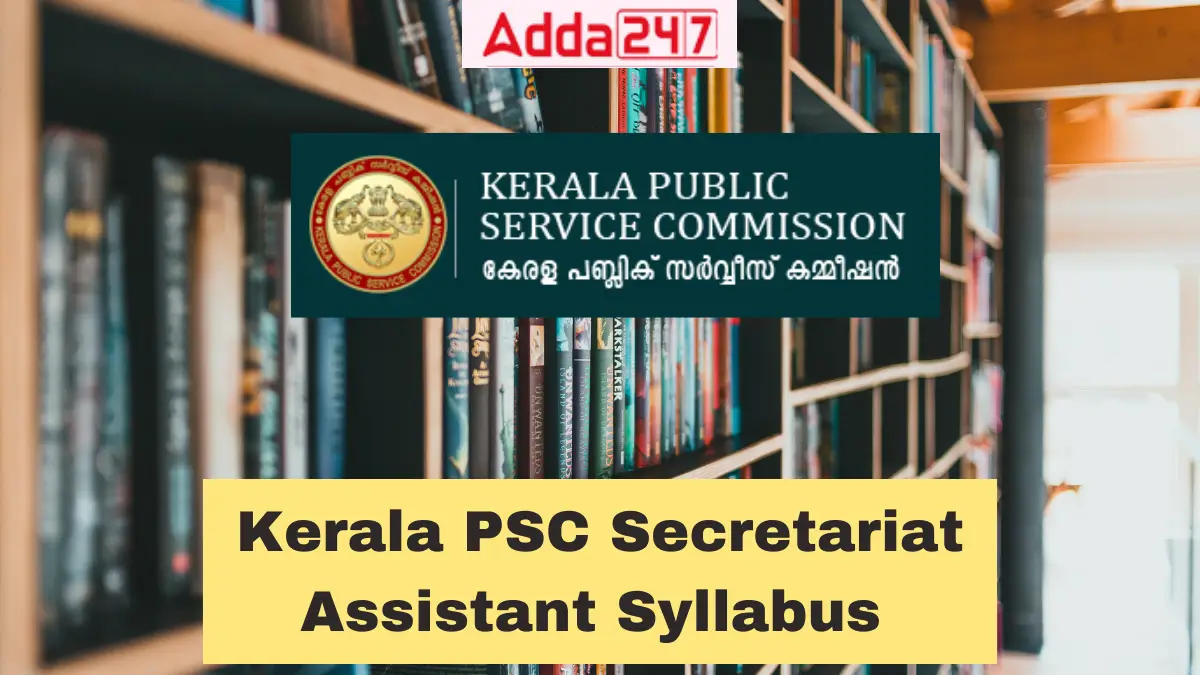


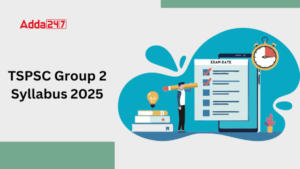 TSPSC Group 2 Syllabus 2025, Check Exam ...
TSPSC Group 2 Syllabus 2025, Check Exam ...
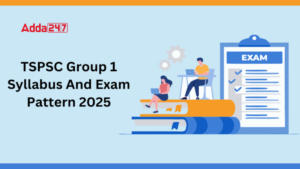 TSPSC Group 1 Syllabus And Exam Pattern ...
TSPSC Group 1 Syllabus And Exam Pattern ...
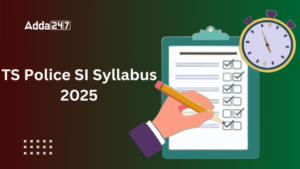 TS Police SI Syllabus 2025, Exam Pattern...
TS Police SI Syllabus 2025, Exam Pattern...

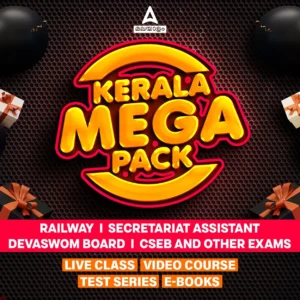
 Adda247 Job portal has complete information about all Sarkari Jobs and Naukri Alerts, its latest recruitment notifications, from all state and national level jobs and their updates.
Adda247 Job portal has complete information about all Sarkari Jobs and Naukri Alerts, its latest recruitment notifications, from all state and national level jobs and their updates.